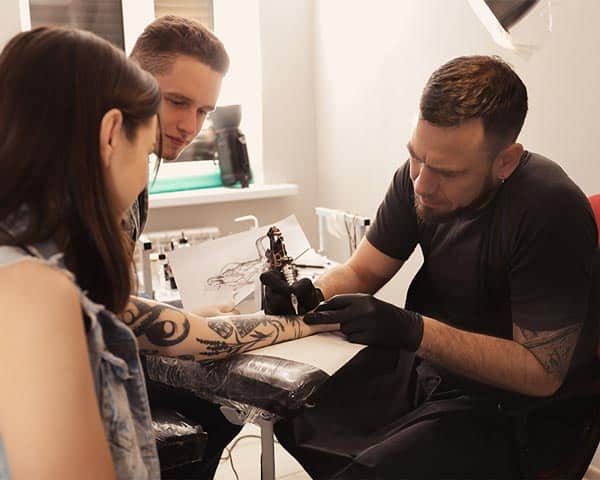Tattoo School: The Educational Path For Tattoo Artists

Is it your dream to become a tattoo artist?
A tattoo school will help you get through your needed courses and paths to become one. Pursuing a career in tattooing needs plenty of your time and money.
In this guide, we’ll teach you what you need to do to be a tattoo artist. Read on to see where your time and money will go.
How to Become a Tattoo Artist
Becoming a tattoo artist can be a rewarding career if you love a passion for art and design. There is more than one way to become a tattoo artist. It all depends on what type of artist you want to be, your talent, skills, finances, and opportunities.
However, there are common steps that all aspiring tattoo artists must follow. Read on to see what you can learn in a tattoo school.
Learn More About Art
Tattoos are becoming more accepted as a form of modern art. Tattoo schools will teach you how to create appealing drawings suitable for any body part. Take the time to learn on your own and make unique designs.
You can study the popular works of famous tattoo artists. Try to go for different art forms to be more flexible in designs. Some styles of tattoo art include Haida, tribal, cartoon, fine line, and many more.
Establish Basic Design Knowledge
Art schools are a great place to study, but they don’t dedicate their studies to tattoo art. However, tattoo artists don’t require formal education or a high school diploma. It’s best you weigh the pros and cons of your situation and needs to learn tattooing knowledge.
The best advantage of attending art or tattoo classes is that you have an art degree. You can also learn more about design, illustration, digital arts, and graphic design. The degree helps you develop a strong background in art history and studies.
Build a Proper Portfolio
One of the most important tools in your artist belt is an art portfolio. Your portfolio will help your customers and mentors to look at your best work. It makes it easier for clients to check if your art style works well with what they want.
Make sure to include at least 25 with 100 drawings maximum to showcase your versatility as an artist. Include works that are in black and grey. This will demonstrate your strong technique and talent for designing tattoos.
Avoid placing your artwork versions of other artists in your portfolio. If you’re not a licensed tattoo artist, don’t include photos of tattoos you’ve given. Don’t forget to add your cover letter and resume for potential mentors.
Go for an Apprenticeship
When you’re confident about your art skills and ability, it’s time to get some hands-on experience. Work under a reputable and trustworthy tattoo shop. Check how they abide by basic hygiene rules and they have plenty of clients.
Make sure that your mentor has had an apprentice before. Learning from someone who has no experience teaching others is not the best choice. Search for a mentor who has an idea of teaching what works and what doesn’t for you.
To approach a shop about apprenticeship starts with your search for your local tattoo artists. Make face-to-face contact and talk about the training. Note that most apprenticeships have a fee, costing as high as $10,000.
What Should You Do After?
When you finish your apprenticeship, what should you do next? Get to know how to operate tattoo machines, hygienic practices, and professional business skills. Here are a few things you should do to become a licensed tattoo artist.
Obtain Pre-License Training and Certificate
After your apprenticeship, you need to grab a few certifications and go through training courses. You need to meet your state’s local licensing requirements to give tattoos legally. It’s best that you take classes on business, disease control, and health care concepts.
It will help you when dealing with and preventing infections from tattoos. Most states follow strict health and safety guidelines regarding tattooing. Learning more about business and health safety makes it easier for you to deal with common tattooing issues.
Get a License
Now that you have the skills, experience, and education, it’s time to start tattooing on your own. You need to review your state’s tattoo artist requirements. Some states look for your hours of training and the number of tattoos done under apprenticeship.
Other states also look at your skills assessment, degree, and written exams. When you meet the prerequisites, you’ll need to apply for the license. Most states need you to fill a form and pay a fee to get your official license.
Buy Your Own Equipment
Once you have your license, you can buy your own tattoo equipment. Most tattoo shops require artists to bring their supplies, so it’s best to invest in the basic tools. Here are some of the basic equipment that you need:
- Green cleaning soap
- Spray bottles
- Two tattoo guns
- Ultrasonic
- Grips and tubes
- Sterile needles for shading and lines
- Small plastic cups for the ink
- Gloves
You need to be consistent in cleaning and taking care of your tools. Constant care will help extend the lifespan of these expensive tools.
Start Your New Career
When you finally put it out there that you’re a tattoo artist, you have two options. You can apply at a tattoo shop or join the tattoo industry with your own studio. When applying at a tattoo shop, you need to show both your resume and portfolio.
Opening up a studio needs extra steps and takes longer, but it’s possible with a plan and budget. It’s best that you obtain business licenses and permits before opening your studio. Make sure you make a business plan, including your finances and strategies.
Learn the Secrets in a Tattoo School
The payoff from attending a tattoo school has a high potential to become so much more. You should pick the path that matches your needs, finances, and skills.
Do you need help with learning more about how to become a tattoo artist? Contact us and we’ll help you with your inquiries about tattooing. Be sure to check out our software, your best tattoo studio software.






